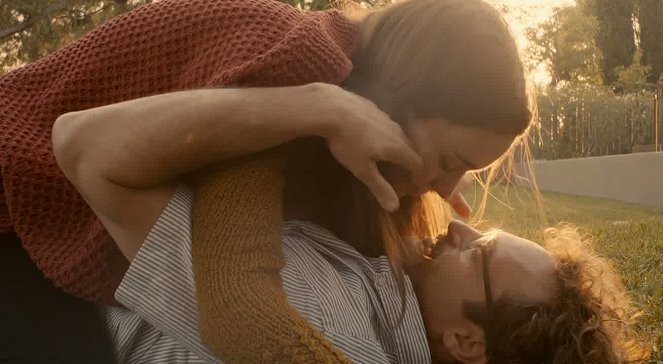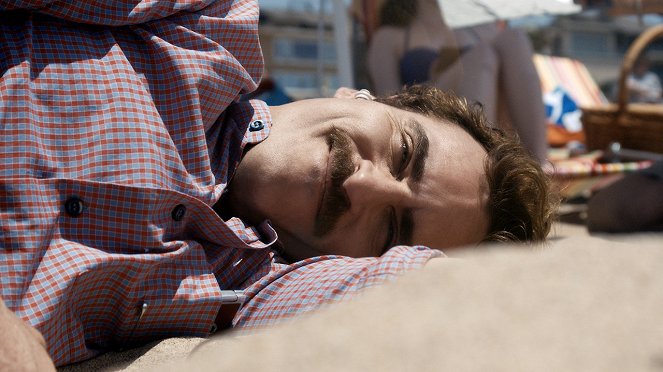Directed by:
Spike JonzeScreenplay:
Spike JonzeCinematography:
Hoyte van HoytemaCast:
Joaquin Phoenix, Amy Adams, Scarlett Johansson, Rooney Mara, Olivia Wilde, Chris Pratt, Matt Letscher, Portia Doubleday, Sam Jaeger, Katherine Boecher (more)VOD (4)
Plots(1)
Spike Jonze directs this award-winning drama following Theodore Twombly (Joaquin Phoenix), a lonely writer who falls in love with a sentient operating system. Newly separated from his wife Catherine (Rooney Mara), Theodore works for a company that composes love letters for those who lack the creativity to pen their own. Growing more and more isolated from the outside world, his curiosity is piqued by a campaign advertising the latest artificially intelligent operating system. When he is first introduced to his new technological assistant Samantha (voice of Scarlett Johansson) he is surprised by her ever-growing emotionality and fresh way of looking at the world. As time passes, Theodore finds himself connecting with Samantha in ways he could never have imagined. (Entertainment in Video)
(more)Videos (3)
Reviews (12)
A virtual romance that to a certain extent adheres to the formula of its more traditional genre kin (boy meets girl, boy loses girl...), but because of the physical absence of a female partner and other vacant places in the space of the picture, it gives off a strange feeling of loneliness throughout its runtime. Joaquin Phoenix has to perform most of the boldly long shots on his own. In fact, he does the acting of two, as there is no visible reaction to his action. That which is essential happens either within the protagonist or off screen – in the soundtrack, which Theo also controls to a significant extent. For example, he chooses the (melancholic) soundtrack for his own life, by means of which the film not only thematises the manipulation of others’ lives (Sam becomes the new director of Theo’s existence), but also acknowledges his manipulative practices and thus deliberately diminishes their effectiveness. ___ The sluggish narrative pace and the emotional restraint at the level of formalistic techniques correspond to the strongly subjectivised (in terms of both image and sound) narrative. In various ways, the film itself is as shy as Theo, who also seems cut off from the outside world due his being situated in otherwise empty shots. Instead of the aforementioned absent partner, there is an interactive mise-en-scene that illustrates the protagonist’s mood and comments on the situations in which he finds himself. But the shyness shared by Theo and the film as a whole does not fit well with the film’s occasional lapses into vulgarity (erotic chatting, Samantha’s anal humour). However, we can perceive the overstepping of the boundaries of tastefulness as a means of pointing out the acceptance with which we allow virtual worlds to penetrate our intimate space (with similar acceptance, Theo tells the computer about his relationship with his mother). ___ With slight generalisation, it could be said that the desire to change something while not giving up one’s comfort is a paradox inherent not only in Theodore, who is afraid to step into the unknown and permanently cut off (real) contact with his former girlfriend, but also in the whole world today. Everything is outwardly perfect and cosy (which is aided in the film by the soothing pastel colours). We live in a state of comfort that was definitely never the standard before, but at the same time, we are often lonely, isolated and rarely truly happy, because we are always in search of the most convenient solutions (because the software that we buy will logically oblige us in everything). Surface perfection conceals inner emptiness. Substitutes for real people, real feelings and real actions simplify life to such an extent that we lose contact with it. Others express emotions for us by means of letters composed without the necessity of touching the keyboard (let alone using a “manual” writing implement). ___ However, Jonze is not a sceptic who would resolutely reject modern technology. He doesn’t completely condemn the possibility of a contactless relationship – for example, Theo’s dialogue with Amy seems just as unforced as his conversations with Sam – but only points out the drawbacks of choosing to live without touch. Whether that involves the visual absence of a partner in our memories or the loss of the “aura” of a beloved and still certainly original object. Fortunately, there are no appropriate alternatives to certain pleasant realities, even in a world of perfect replacements and substitutes. For now… 80%
()
(less)
(more)
As a short film this could have been a five-minute shootout or even a twenty-minute nostalgia, but Spike Jonze decided to give this idea a full-length form – and he did well. He holds the whole concept at such a high level that it is clear from the beginning that the finale cannot meet the audience's expectations. Because no matter how it ends, it will mean the end of that dream come true. And precisely at the edge of two hours, the elevating and universally personal premise spills over, not least in terms of how intensely it is intimate for us, romantic thinkers. However, I am still amazed at how perfect all the scenes are that depict a person in a state of hunger for love and hurling themselves down obviously blind alleys.
()
Spike Jonze's film was preceded by a reputation as a cultured romantic spectacle with refined acting performances, artistic visuals, and a sophisticated aesthetic. In short, it was one of the hot candidates for the Oscars. The praise was not lying. If the film were a date, then She has a fine appearance, a meeting with her will definitely not offend anyone, and it is a date on a level where you don't feel like wasting your time with someone mediocre. But unfortunately, a connection with her didn't develop for me. I have no problem with the casting, as Joaquin Phoenix is an excellent actor and delivers exactly what is expected of him. He gives his character a sadly melancholic and even tragic dimension, and his loneliness gradually starts to hurt you physically. I also have no problem with the filmmaking in any way. What I do have a problem with, however, is the genre direction, as well as the way the characters are portrayed and the lack of identification with them. I also have difficulty with how the screenwriter works with the material. This theme directly invites a comedic approach, and in the first few minutes, it seemed to be heading that way and I was enjoying it. But as soon as it turned into a study of human loneliness and emotional dissatisfaction, I started to distance myself from the film. This is especially true when the director presents his protagonist as a victim and someone I should sympathize with. So, who is the victim then? Technology? It is just a tool that can be used well or poorly. If you look into a contemporary restaurant, you will see several couples who show much more interest in their mobile phones than in each other. But those phones are not to blame for their inability to communicate. Computers can save time and perform a huge amount of work, or you can mindlessly waste a lot of time with them. Online discussions can serve as excellent platforms for exchanging opinions and information, but also for empty talk and trolling. If Theodore is someone's victim, then he is a victim of his own nature and actions. I see a man prone to depression who refuses to admit his illness and wallows in his own self. I see a blind man who overlooks the values that are right in front of him. I see a fool who prefers a substitute where he can - and he really can - have a full-fledged relationship. There are very few film characters that I dislike as much as Theodore, and during the final scene on the rooftop of a high-rise building, when the protagonists are about to escape from themselves, I had the strong urge to kick those two cowards down myself. As for love for a computer program, in our world, there are countless substitutes and replacements for a romantic relationship. You can travel, immerse yourself in your work like a workaholic, or dedicate your feelings to fish in an aquarium. A computer program, if cleverly set up, could become a highly seductive and efficient substitute for love, but it will always be a one-sided affair. I grew up on the works of Stanislaw Lem, and they are marked by a deep skepticism toward the possibility of understanding between different civilizations, cultural circles, or even animal species. It is absurd to assume that if I cannot understand, accept, and love other members of the same species, I will gain and maintain a love for artificial intelligence based on completely different values and perceptions. Such a program would cease to fulfill its function precisely at the moment when the term artificial intelligence is fulfilled and it surpasses the barrier imposed by the program. By the way, this development would be much faster than Spike assumes. Overall impression: 45%.
()
(less)
(more)
As a romantic film for romantics who are bored of cinematic romance and who turn off the TV before a couple in love have their last passionate kiss in the rain, Her is an absolutely brilliant choice. The original story set in the future works with so many unfamiliar and novel elements that it actually puts pressure on itself in order to successfully withstand all that new and strange stuff without ironically falling into the mundane. And despite the slightly cringe and sleepy last act, I can solemnly declare that the peculiar creator Spike Jonze has once again mastered his difficult task. This is by no means a deep odyssey across the sexual cells of humanity, and the romantic atmosphere simply couldn't work that well with the unmistakable female element replaced by a computer (as sexy as the voice sounded), but to be fair, the direction is flawless, originality clearly triumphs, and the script is built cleverly enough to keep our attention until the somewhat lacklustre finale. And God forbid that this vision should ever come true. :) 80%
()
It was with this movie that I started catching up with last year’s movies before Oscar night. Her attracted me with the premise and mainly with the actor. Joaquin Phoenix is an incredible actor. But what can you do when he often chooses pretty strange characters that are hard to figure out? And he delivers a pretty precise performance every single time. To such extent that you actually don’t know what to think about him as a person because with every film you get a different opinion of him. Once he drives you mad, another time you don’t understand why he acts the way he does and the next time you really understand him. But that’s actually not easy because I think that Joaquin tries to act in a way that will make nobody have understanding for him. All his characters are so specific that it’s really hard to find yourself in them in any way. Her represents a pretty strange view of the world that could come about if we are fully consumed by computer systems. Not in a bad way like in I, Robot. This is more a matter of psychology. Joaquin did a terrific job, but Spike Jonze made the movie the same way he makes all his movies – his way. I had a hard time looking for understanding in the movie but it hasn’t ceased to amaze me since I saw it.
()


